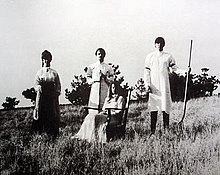Music Emporium
Music Emporium was an American
History
Group leader Bill "Casey" Cosby (multi-instrumentalist, vocals) possessed a classical music and
Rustad and Wade departed the group, though the latter continued to write songs with Cosby. The finalized line-up of the band was complete when they added guitarist Dave Padwin, who was first encountered at a guitar shop on Santa Monica Boulevard.[3] Through his connections in the music industry, Cosby convinced record producer Bill Lazerus to record demos with Cage at Sunset Recorders Studios.[4] Initially, Lazerus could not find any record label to sign the group to complete an album, until Jack Ames, a producer who was fired from Liberty Records, hoped to recruit the band to his own independent label. Per Ames's suggestion, Cage changed their name to Music Emporium under the assumption the "softer" moniker would translate to a wider audience. With financial limitations burdening the band, Ames only re-recorded the vocals over the pre-existing instrumentals from the demo sessions.[2]
Music Emporium was released in 1969 on Sentinel Records, with a limited run of 300 copies. Included in the album's package was an elaborate die-cut cover through whose "windows" the portrait of the Music Emporium on the inner sleeve photo could be seen.
Cosby revealed in an interview the band had the basic concept prepared for a follow-up album, with a working-title Multiple Choice, Everyone's Almost There. However, the Music Emporium disbanded in late 1969 when Cosby was drafted to enter service in
Members
- Bill "Casey" Cosby – multi-instrumentalist, vocals
- Dora Wahl – drums
- Thom Wade – lead guitar, vocals (1967–1968)
- Steve Rustad – bass guitar (1967–1968)
- Dave Padwin – lead guitar (1968–1970)
- Carol Lee – bass guitar, piano, vocals (1968–1970)
Discography
Single
- "Nam Myo Ho Renge Kyo" b/w "Times Like This" – Sentinel (4–501), 1969
Album
- Music Emporium – Sentinel (PC-690001), 1969
References
- ^ a b "Classic Singles #90: Music Emporium – Nam Myo Ho Renge Kyo / Times Like This (1968)". cosmicmindatplay.com. Retrieved June 24, 2016.
- ^ a b Cost, Jud (2001). "Music Emporium (CD booklet)". Sundazed Records.
{{cite web}}: Missing or empty|url=(help) - ^ a b c Pollara, James (April 26, 2015). "Music Emporium – An interview with William Cosby". It's Psychedelic Baby! Magazine. Archived from the original on December 25, 2020. Retrieved December 25, 2020.
- ^ "Music Emporium "Music Emporium"". therisingstorm.net. Retrieved June 24, 2016.
- ^ "The Music Emporium (Obscure Classics)". activelistener.com. Retrieved June 24, 2016.
- ^ Unterberger, Richie. "The Music Emporium – Review". allmusic.com. Retrieved June 24, 2016.
- ^ Unterberger, Richie. "Music Emporium – Biography". allmusic.com. Retrieved June 24, 2016.
- ^ "Music Emporium Discography". discogs.com. Retrieved June 24, 2016.

